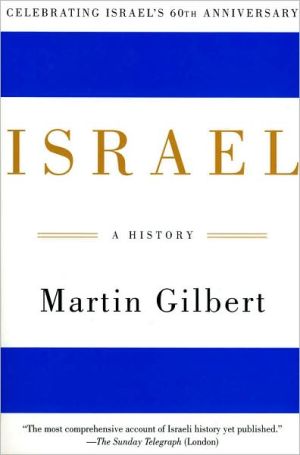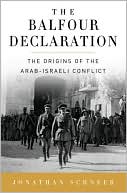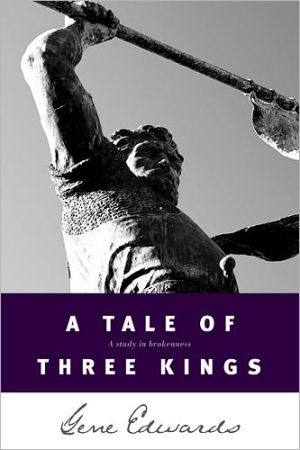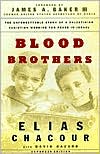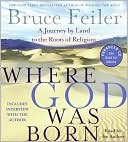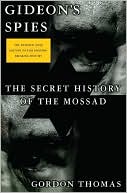Israel: A History
Israel is a small and relatively young country, but since the day of its creation half a century ago, its turbulent history has placed it at the center of the world stage. In this new account, Martin Gilbert traces Israel's history from the struggles of its pioneers in the nineteenth century up to the present day. Along the way, he describes the defining moments in the history of the Jewish people, among them the Balfour Declaration of 1917; the United Nations Partition Resolution of 1947;...
Search in google:
Israel is a small and relatively young country, but since the day of its creation half a century ago, its turbulent history has placed it at the center of the world stage. In this new account, Martin Gilbert traces Israel's history from the struggles of its pioneers in the nineteenth century up to the present day. Along the way, he describes the defining moments in the history of the Jewish people, among them the Balfour Declaration of 1917; the United Nations Partition Resolution of 1947; and the founding of the State of Israel in 1948.The desire for statehood long preceded the declaration of the State: For two millennia the Jews, dispersed all over the world, prayed for a return to Zion. The prayer "Next Year in Jerusalem" seemed a fantasy--until Theodor Herzl, in the last decade of the nineteenth century, transformed Zionism into a modern political movement. Soon the earlier trickle of Jewish immigrants turned into a flood as Jews sought fulfilment of their national aspirations or fled persecution in Europe.The declaration of Statehood in May 1948 and the War of Independence were only the beginning of the drama. Israel's subsequent development was dominated by the conflicts of Suez, the Six Day War, the October War, the Lebanon and the Intifada, as well as by diplomatic watersheds--from the early armistice agreements to the Camp David negotiations, the Madrid conference, and the Oslo peace process. Guiding us through the events that have shaped modern-day Israel, Gilbert examines not only Israel's political history and personalities from Ben-Gurion to Rabin, Peres, and Netanyahu, but also its society, culture, and economy.Israel is often at the center ofworld attention--usually because of wars, political and social divisions, conflict with her Arab neighbors and the Palestinians in her midst, and the stark intrusion of acts of terror into daily life. But even though conflict has been so much a part of everyday existence, the history of Israel ultimately uplifts and inspires. During the past fifty years, the quality of life has been transformed: Israel is a vibrant and flourishing nation that has made significant achievements in science, agriculture, trade, and industry--and has grown in population from just over half a million to almost six million.Basing his narrative on a wealth of contemporary documents and eyewitness accounts, as well as on his own intimate knowledge of the country, Martin Gilbert provides a riveting and moving account of the history of Israel.This is a riveting account of the history of Israel on its fiftieth anniversary by one of the world's preeminent historians.The founding of the State of Israel in May 1948 was a dramatic event in the history of the twentieth century. In Israel: A History, Martin Gilbert tells the gripping story of the events and personalities in the half century leading up to the declaration of statehood, and of Israel's subsequent development. It is a story punctuated by the conflicts of the War of Independence, Suez, the Six-Day War of 1967, the October War of 1973, the Lebanon and the Intifada, as well as by the diplomatic watersheds, from the armistice agreements of 1949 to the Camp David negotiations, the Madrid conference, and the Oslo accords. As Gilbert chronicles the growth of this flourishing but often troubled nation, he examines not only Israel's political history from Ben-Gurion to Rabin, Peres, and Netanyahu, but also its society, culture, and economy. Based on contemporary documents and eyewitness accounts, and rooted in the author's intimate knowledge of the country and its people, Israel: A History will be essential reading on the nation's fiftieth anniversary. Publishers Weekly Gilbert's impassioned history adds immeasurably to our understanding of the forces that have shaped contemporary Israel. Digging up a wealth of primary source material and quoting liberally from letters, memoirs, eyewitness accounts, interviews, memoranda and diaries of David Ben-Gurion, Golda Meir, Moshe Dayan, Abba Eban, Shimon Peres, Teddy Kollek and dozens of ordinary people, the eminent British historian (The Holocaust) has produced a gripping epic. Gilbert's extensive behind-the-scenes and on-the-battlefield coverage of Israel's numerous wars with its Arab neighbors adds much new detail. While the narrative focuses predominantly on politics, high-level diplomacy and war, it also illuminates other topics, including the Jewish settlement of Palestine in the early years of this century, tensions between secularists and Orthodox Jews, Israeli military intelligence operations, the current impasse in negotiations with Palestinian Arabs and the ferment of Israeli society, which Gilbert portrays as a diverse mixture of immigrant peoples that embody many different strands of Judaism yet are united by Israeli culture. (Apr.)
Ideals of Statehood\ Since the destruction of the Second Temple by the Romans in AD 70, the Jews, who were dispersed all over the Roman Empire, had prayed for a return to Zion. 'Next year in Jerusalem' was — and remains — the hope expressed at the end of every Passover meal commemorating the ancient exodus from Egypt. For two millennia the dream of such a return seemed a fantasy. Everywhere Jews learned to adapt to the nations within whose borders they lived. Frequent expulsion to other lands made a new adaptation necessary, and this was done. But Zion, which had been under Muslim rule almost without interruption since the seventh century, and under the rule of the Ottoman Turks since the early sixteenth century, was possible only for a few.\ The perils of the journey could be severe. Of 1,500 Jews who travelled from Poland, Hungary and Moravia to Palestine in 1700, as many as 500 died on the way. But the imperative to return physically from exile never entirely died. In 1777 more than 300 Hasidic Jewish families, upholders of ultra-Orthodox Judaism, made the journey from Poland to Palestine. In 1812 some 400 followers of the Vilna Gaon — one of the enlightened Jewish sages of his generation — made the journey from Lithuania.\ By the middle of the nineteenth century about 10,000 Jews lived in Palestine. More than 8,000 of them lived in Jerusalem. A few hundred lived in the holy city of Safed, in the north, where several Jewish sages were buried, in the mountain village of Peki'in (which had a tradition of continuous Jewish settlement since Roman times) and in nearby Tiberias on the Sea of Galilee. In the coastal town of Acre lived 140 Jews,mostly pedlars and artisans, but many without any means of support. There were several hundred Jews in Jaffa.\ Most of the Jews in Palestine were immigrants from Poland and Lithuania. Many of them survived on charity, sending regular begging letters back to their original communities in Europe, and even dispatching special emissaries to raise funds. But the attraction of Palestine was growing. In 1862 a German Jew, Moses Hess, an advocate of the Jewish return to Palestine, wrote in his book Rome and Jerusalem of how his Jewish 'nationality' was connected 'inseparably' with the Holy Land and the Eternal City. Hess added, 'Without a soil a man sinks to the status of a parasite, feeding on others.'\ Eight years later in 1870 a French educator, Charles Netter, with the approval of the Turkish authorities, founded an agricultural school at Mikveh Israel (Hope of Israel). The name was taken from a description of God in the book of Jeremiah. Located a few miles inland from Jaffa, Mikveh Israel was a settlement to which Jews living in countries where they experienced various educational disabilities and restrictions — initially Persia, Roumania and Serbia — could come to live and study.\ It was in 1876 that the British Christian writer George Eliot (a pseudonym for Mary Ann Evans) completed her novel Daniel Deronda. It was to make its impact on many Jews, among them two Russian Jews, Eliezer Ben-Yehuda and I. L. Peretz, both of whom were to exert considerable influence, through their own writings, on Jewish national aspirations. One passage in the novel was often quoted.\ Revive the organic centre; let the unity of Israel which has made the growth and form of its religion be an outward reality. Looking towards a land and a polity, our dispersed people in all the ends of the earth may share the dignity of a national life which has a voice among the peoples of the East and the West — which will plant the wisdom and skill of our race so that it may be, as of old, a medium of transmission and understanding.\ In 1878 a number of Jews from Jerusalem decided to establish a Jewish village in the Palestinian countryside. Their first effort — was to buy some land near Jericho, but the Sultan refused to allow ownership to be transferred to Jews. They did manage to buy land from a Greek landowner in the coastal plain, and named their village Petah Tikyah (Gateway of Hope), but malaria, disappointing harvests, and quarrels among them led to failure. By 1882, when they abandoned the village, there were only ten houses and sixty-six inhabitants.\ Also founded in 1878, by religious Jews from Safed who wanted to earn their own livelihood, and not be dependent on charity, was the village of Rosh Pinah. Lacking funds and experience, and frequently harassed by the Arabs from nearby villages, they gave up after two years, but Roumanian Jews, driven from Roumania by persecution and poverty, renewed the settlement in 1882, and obtained sufficient aid from the French Jewish philanthropist Baron Edmond de Rothschild to survive. Growing tobacco and planting mulberry trees for silkworms were two of their enterprises. Like so many of the Jewish settlements that were to be founded in Palestine, the name of Rosh Pinah was taken from a biblical phrase, in this case the 'head stone' from Psalm 118: 'The stone which the builders refused is become the head stone of the corner. This is the Lord's doing. It has become marvellous in our eyes.'\ Copyright ) 1998 by Martin Gilbert
IntroductionAcknowledgementsList of photographsList of maps1Ideals of statehood32Towards Zion163Beyond the Balfour Declaration, 1918-1929364Threats and dangers, 1929-1937595Hopes ... and blows, 1937-1939826The Second World War, 1939-19451007The British Mandate continues, 1945-19461218Year of decision, 19471419Undeclared war, November 1947-April 194815310The conflict intensifies, April-May 194817011The War of Independence, May 1948 to the first truce18612From the first truce to the second truce20913From the second truce to the armistice agreements22314The last four months of the war24015The ingathering of the exiles25016Conflicts and achievements, 1952-195527917Paths to war, December 1955-October 195630618The Sinai campaign32019A State in being, 1956-196332920Years of growth, 1963-196634921Nasser's challenge36522The Six Day War38423The dilemmas of victory39624The October War, Yom Kippur 197342625The fourth postwar era46226To the Lebanese war and beyond49627Intifada52528Towards Madrid and Oslo54329The peace process56830'Shalom, haver' - Peace, my friend588Maps621Glossary665Bibliography of works consulted671Index681
\ From Barnes & NobleThe Barnes & Noble Review\ May 1998\ \ The creation of Israel in 1948 was greeted as "a milestone in the history of the world." However, the founding of the Jewish state was not only important in political realms; for centuries, it had been the impossible dream of the Jewish people. In his newest book, Israel: A History, eminent historian Martin Gilbert tells how the "illusion" became reality. \ Through Gilbert's compassionate portrait, a society that is frequently riven by tensions between, and within, ethnic groups and ideological positions emerges as vibrant. Unlike any other nation in history, Israel had to overcome dreadful hardships while being founded on high ideals and great expectations. Gilbert accomplishes far more than a survey of Israel's 50-year history. He starts his account of the struggle to create the state with a look at its beginnings in the 19th-century Zionist movement and the first pioneers, who contended with hostile Arab neighbors and endemic malaria to found Jewish settlements in a harsh land, fulfilling a 2,000-year-old dream.\ Israel: A History not only covers the story of the nation but also includes the personal stories of numerous individuals who had a profound impact on the country, including Theodor Herzel, a Hungarian-born Jew who founded the World Zionist Organization in 1896. Among other figures Gilbert brings to life are Chaim Weizmann, a Russian Jew who attended the Second Congress in 1898 and went on to become Israel's first president; and a young Russian immigrant named David Gruen, who nearly died of malaria in 1906 and who,asDavid Ben-Gurion, "was to play the leading part both in the establishment of a Jewish State fifty-two years later and in its growth and preservation," Gilbert writes.\ Gilbert's detailed and readable account of the history of Israel covers such milestone events as the Balfour Declaration of 1917, in which the British became the first nation to support a "National Home for the Jewish People" in Palestine, and the British mandated government following World War I. Gilbert's description of the War of Independence — the first of five wars fought by Israel for its survival — combines military, social, and diplomatic history into a riveting narrative of both heroism and cowardice.\ \ \ \ \ \ Publishers Weekly - Publisher's Weekly\ Gilbert's impassioned history adds immeasurably to our understanding of the forces that have shaped contemporary Israel. Digging up a wealth of primary source material and quoting liberally from letters, memoirs, eyewitness accounts, interviews, memoranda and diaries of David Ben-Gurion, Golda Meir, Moshe Dayan, Abba Eban, Shimon Peres, Teddy Kollek and dozens of ordinary people, the eminent British historian (The Holocaust) has produced a gripping epic. Gilbert's extensive behind-the-scenes and on-the-battlefield coverage of Israel's numerous wars with its Arab neighbors adds much new detail. While the narrative focuses predominantly on politics, high-level diplomacy and war, it also illuminates other topics, including the Jewish settlement of Palestine in the early years of this century, tensions between secularists and Orthodox Jews, Israeli military intelligence operations, the current impasse in negotiations with Palestinian Arabs and the ferment of Israeli society, which Gilbert portrays as a diverse mixture of immigrant peoples that embody many different strands of Judaism yet are united by Israeli culture. (Apr.)\ \ \ Library JournalFrom Churchill's official biographer: a 50th-anniversary history of Israel.\ \ \ \ \ BooknewsTraces Israel's history from the struggles of its pioneers in the 19th century through the present day, and details defining moments in the history of the Jewish people. Examines not only the country's political histories and personalities, but also its society, culture, and economy. Includes some 70 b&w photos, plus maps and a glossary. Annotation c. by Book News, Inc., Portland, Or.\ \ \ \ \ Kirkus ReviewsOne of the first in a slew of books forthcoming to mark the 50th anniversary of the founding of the State of Israel: a thorough and thoroughly entertaining history of that nation's first half centuryþfrom a Labor Party point of view. The prolific historian and Churchill biographer Gilbert (A History of the Twentieth Century, 1997; Holocaust Journey, 1997) covers the remarkable story of Israel's miracles and debacles from the time a Zionist state was a gleam in Theodor Herzl's eye to the latest shrill attack on current Prime Minister Netanyahu for building Jewish housing in the old city of Jerusalem. But Gilbertþs pro-Labor bias somewhat distorts not only his interpretation of the past but his perspective on the present and future of a nation that is becoming increasingly oriental and traditional and is now governed by a coalition representing those, rather than Laborþs, interests. A rich history with a progressive stance. \ \
